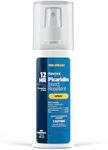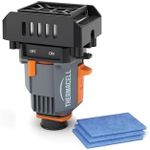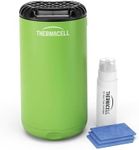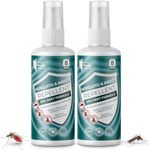Buying Guide for the Best Insect Repellents
Choosing the right insect repellent is crucial for ensuring your comfort and safety, especially when spending time outdoors. The right product can protect you from insect bites, which can be both irritating and potentially harmful due to the diseases some insects can carry. When selecting an insect repellent, consider factors such as the type of insects you need protection from, the duration of protection you require, and any personal preferences or sensitivities you may have. Understanding the key specifications of insect repellents will help you make an informed decision that best suits your needs.Active IngredientThe active ingredient in an insect repellent is the chemical that repels insects. Common active ingredients include DEET, picaridin, oil of lemon eucalyptus, and IR3535. DEET is known for its effectiveness and long-lasting protection, making it suitable for areas with high insect activity. Picaridin is a good alternative for those who prefer a less greasy feel and a milder scent. Oil of lemon eucalyptus is a natural option, but it may not last as long as synthetic ingredients. IR3535 is gentle on the skin and suitable for sensitive users. Choose an active ingredient based on the level of protection you need and any personal preferences or sensitivities.
ConcentrationThe concentration of the active ingredient in an insect repellent determines how long the protection will last. Higher concentrations provide longer-lasting protection but may be more potent on the skin. For example, a repellent with 30% DEET can offer protection for up to 6 hours, while a 10% concentration might last for about 2 hours. Consider the duration of your outdoor activity and choose a concentration that matches the length of time you need protection. For short outings, a lower concentration may suffice, while longer excursions may require a higher concentration.
FormulationInsect repellents come in various formulations, including sprays, lotions, wipes, and wearable devices. Sprays are convenient for covering large areas quickly, while lotions can be more precise and less likely to be inhaled. Wipes are portable and easy to apply, making them ideal for travel. Wearable devices, such as bracelets, offer a hands-free option but may not provide as comprehensive coverage. Consider your application preferences and the convenience of each formulation when making your choice.
Target InsectsDifferent insect repellents are formulated to target specific types of insects, such as mosquitoes, ticks, or flies. It's important to choose a repellent that is effective against the insects you are most likely to encounter. For example, if you're hiking in a tick-prone area, select a repellent that specifically mentions tick protection. Understanding the types of insects in your environment will help you choose a product that offers the best protection.
Skin SensitivitySome people may have sensitive skin or allergies to certain ingredients in insect repellents. If you have sensitive skin, look for products labeled as hypoallergenic or designed for sensitive skin. Natural repellents, such as those containing oil of lemon eucalyptus, may be gentler on the skin. Always perform a patch test before applying a new product extensively, and consider consulting with a healthcare professional if you have concerns about skin reactions.
Water ResistanceWater resistance is an important factor if you plan to be in wet conditions or are likely to sweat heavily. Some insect repellents are formulated to be water-resistant, meaning they will continue to provide protection even when exposed to moisture. If you anticipate being in such conditions, choose a water-resistant product to ensure continuous protection. Keep in mind that even water-resistant repellents may need to be reapplied after swimming or excessive sweating.
















